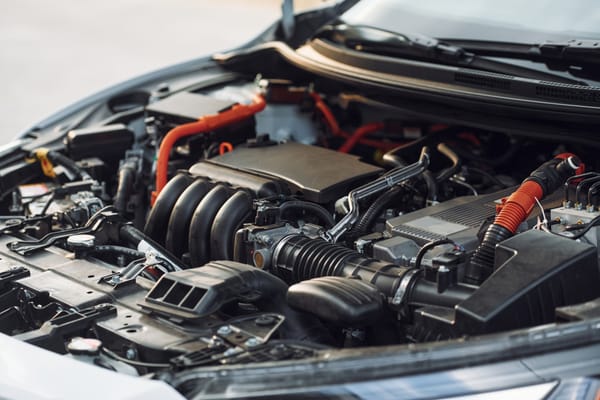How to Extend the Lifespan of Your Car’s Engine

Nowadays, there’s probably nothing more embarrassing than taking your friends on a road trip and having them push-start the engine on a busy road. And when it roars to life, while they cheer with relief, for you it is a different story, an unforgettable one for that matter. It happens.
While it’s still a common problem, no one wants to deal with costly engine repairs or the stress of being stranded on the side of the road. Your car engine should be the dependable workhorse it is made to be. You need to keep it well-maintained, especially if you want to extend its life.
The good news is that Peach Cars is here to provide sound tips on extending the lifespan of your car’s heart. Whether you've just driven a new car off our lot or are nursing along a beloved older model, these straightforward maintenance practices can add years to your engine's lifespan.
But first things first, what contributes to a healthy engine?
Understanding and Keeping Your Engine’s Lifespan Healthy
How long your car’s engine lasts isn't some magical mystery – it's built on a foundation of good habits and a little bit of know-how. What are these cornerstones of a healthy engine?
We’re talking about:
- How regularly it’s maintained – here, think oil changes, filter replacement, fluid checks.
- Your driving habits. How you spin the wheel has a direct impact on the engine’s in terms of wear and tear.
- Those engine coughs that get you off guard. Catch them early and you have avoided major financial headaches down the line.
- The quality of parts and fluids that you use in your car. It’s important to use only recommended products.
Let’s go through each of the above pillars to give you practical tips that you can use right away.
Oil Changes
Oil changes and fluid flushes are the engine’s lifeblood. Knowing how to tinker with them allows your engine to run smoothly.
Oil changes, for instance, serve several functions:
- It reduces the friction between the moving parts, thus, preventing wear and tear.
- It also carries away the dirt, debris, and combustion byproducts that can gunk up your engine.
- It also helps dissipate your car’s heat and prevents it from overheating.
So, how often should you change your oil? Typically, it was recommended that one does this after covering 5,000 kilometres. However, modern vehicles can stretch this to between 8,000 to 12,000 kilometres.
Nowadays, we have something called synthetic oil. If your car is using this, the replacement interval will be long and can extend up to 24,000 kilometres.
Needless to say, our automotive experts here at Peach Cars recommend using the type of oil specified in your owner's manual.
Coolant and Other Fluids
The function of a coolant, which is also known as antifreeze, is to prevent your engine from overheating when it is hot, and from freezing when it’s cold.
Over time, coolants lose their efficacy. That’s when they need to be flushed. This is done by replacing the old coolants with fresh fluids, ensuring optimal cooling performance while also preventing corrosion.
Again, check your vehicle's recommended coolant and use that specific type.
While at it, don't forget about other important fluids! Transmission fluid, brake fluid, and power steering fluid (depending on your car). Regularly checking fluid levels and having them flushed or replaced as recommended keeps all your car's systems running smoothly.
Air Filters
Just like you need clean air to breathe, so does your engine! Think of your air filter as a mask for your engine. Its job is to prevent dust, dirt, pollen, and other debris from entering the engine and causing damage.
A clean air filter ensures your engine gets the clean air it needs for optimal combustion. Why are clogged air filters bad news? Because they can restrict airflow to the engine, which in turn leads to:
- Reduced engine power
- Engine strain
- And reduced fuel efficiency
Spark Plugs
Spark plugs are small but serve a mighty function! They deliver the spark that ignites the air-fuel mixture in your engine's cylinders, initiating combustion and making your car move. Over time, spark plugs wear down. When this happens, your engine starts to misfire, feel sluggish, and begins wasting fuel due to inefficient combustion.
These standard spark plugs should typically be replaced every 10,000 to 30,000 kilometres. But it's important to replace spark plugs at the intervals recommended by your car’s manufacturer as it varies depending on the vehicle type. This ensures optimal engine combustion and performance.
Your Driving Habits
Believe it or not, you have a lot of control over your engine’s lifespan just by changing a few driving habits! Driving smoothly isn't just more comfortable; it's also kinder to your engine.
While driving:
- Accelerate gently – Aggressive acceleration and hard braking puts extra stress on your engine, transmission, and other components. Accelerate gently and anticipate stops so you can brake smoothly rather than slamming on the pedal.
- Don’t push your engine to high RPMS (revolutions per minute) – This is called "redlining" and is indicated by the red zone on your tachometer. While occasional bursts of high RPMs are fine, consistently redlining your engine causes excessive wear and tear over time.
- The opposite of redlining is called “lugging”, and it happens when you’re driving in too high a gear at low speeds. Don’t do this either. This will cause the engine to strain and vibrate uncomfortably. Downshift to a lower gear if your engine feels like it’s struggling or vibrating excessively.
- Warm up in cold weather. Give your car a short warm-up before accelerating out of the parking lot. Significance? It allows the oil to circulate properly and warm up the other components, reducing wear and tear.
Don't Ignore Other Warning Signs
Surprisingly, your car is quite communicative, and it gives you early warning signs when something is wrong with the engine. Listen to these signs before they turn into big problems.
Some of these warning signs include:
- Warning lights – Don’t ignore warning lights. Get them checked out promptly by a qualified technician
- Unusual noises and smells – Don’t ignore any new or unusual noises or smells coming from your engine. Here, we mean:
- Knocking or ticking – Could indicate valvetrain issues or low oil pressure.
- Hissing: Might suggest a coolant leak.
- Burning smell: Could indicate an oil leak or overheating
- Squealing or screeching: Could be belts or other components.
If you get these signs, don't hesitate to investigate.
Bottom Line? Peach Can Help
So, there you have it! How to keep your car’s engine roaring, not wheezing like it’s got a bad cold, really boils down to these key principles: consistent maintenance, good driving habits, and paying attention to early warning signs. It’s not rocket science, and it’s worth the effort.
Taking care of your engine isn't just about avoiding expensive repairs down the line; it’s about enjoying your car for longer, maximizing its value, and having the peace of mind that your trusty ride will be there for you, kilometre after kilometre. It doesn’t have to be complicated.
If you are worried about buying a car that has hidden mechanical problems due to previous abuse, you might consider buying your next ride with Peach Cars. Our expert technicians have the diagnostic tools and experience to conduct a thorough 288-point inspection on any vehicle giving you the peace of mind as you make your purchase decision. Call us today and let our team hold your hand all the way!




